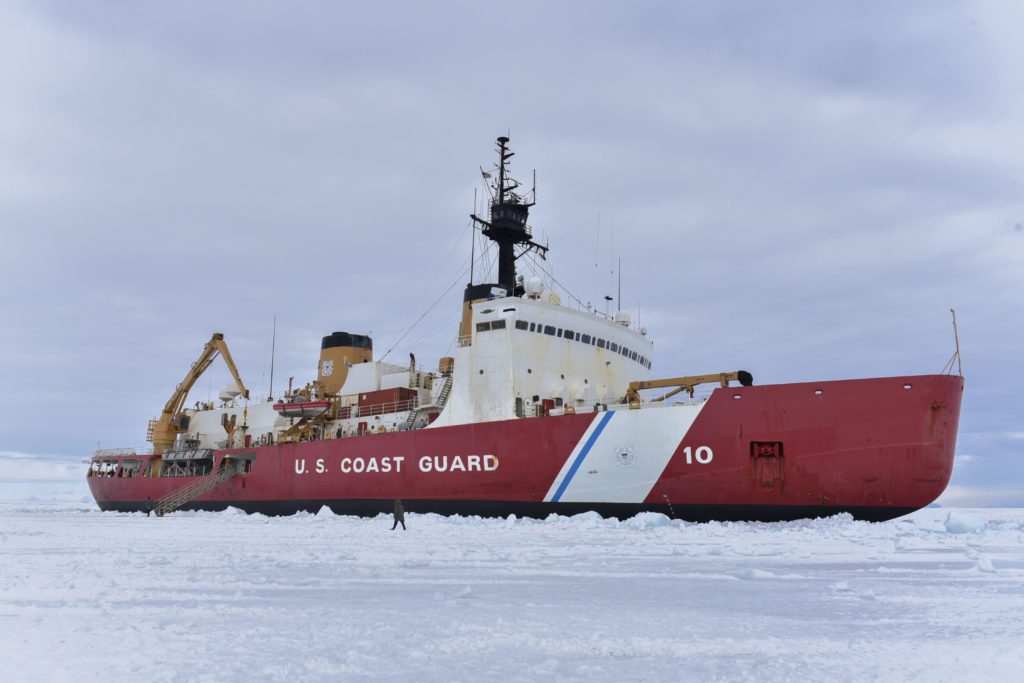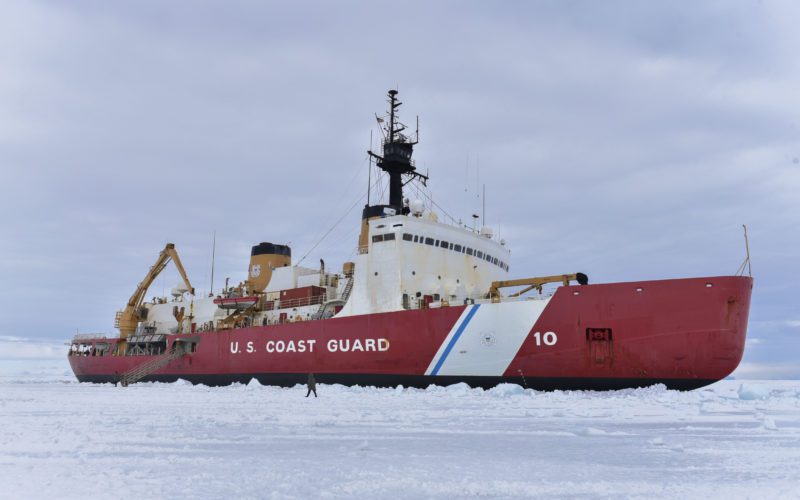(MCMURDO STATION, Antarctica) — The 157 crewmembers of the U.S. Coast Guard cutter Polar Star (WAGB 10) arrived at McMurdo Station in Antarctica on Monday following an 86-day transit from the United States and the cutter’s departure from its Seattle home port Nov. 13.
This deployment marks Polar Star’s 25th journey to Antarctica supporting Operation Deep Freeze, an annual joint military service mission to resupply the United States Antarctic stations in support of the National Science Foundation (NSF), lead agency for the U.S. Antarctic Program (USAP).
Each year, the crew pilots the 399-foot, 13,000-ton cutter to break a navigable channel through miles of ice, sometimes as much as 21 feet thick, to allow fuel and supply ships to reach McMurdo Station, USAP’s logistics hub and largest station.

Polar Star reached the Ross Sea, Antarctica, on Jan. 3 and commenced breaking the 37 miles of ice that extended from the ice pier in Winter Quarters Bay at McMurdo Station out to open water. Polar Star spent four weeks breaking ice and grooming the shipping channel. The crew’s efforts were aided by favorable winds and currents and by month’s end they had created an open and ice-free approach for the supply vessels.
The cleared channel to McMurdo Station will enable two supply vessels, Maersk Peary and Ocean Giant, to safely offload over 8 million gallons of fuel and 1,000 cargo containers. Together these two ships carry enough fuel, food and critical supplies to sustain USAP operations throughout the year until the next sealift opportunity in the austral summer of 2023.
The cutter made international stops in Wellington and Lyttelton, New Zealand, on the way to Antarctica. While in New Zealand, the crew engaged with the Royal New Zealand Navy and the United States Embassy, and volunteered in Christchurch at the local Society for the Prevention of Cruelty to Animals.
Polar Star will also partner with the Royal New Zealand Navy’s largest ship, Aotearoa, in support of resupplying Scott Base, New Zealand’s year-round Antarctic research facility.
“It is a tremendous honor to lead the men and women of Polar Star on this important mission,” said Capt. William Woityra, commanding officer of Polar Star. “This team brought renewed energy and passion to this 46-year-old ship, and overcame significant challenges to deliver exceptional results.”
Assigned to Operation Deep Freeze each year, the icebreaker spends January and February breaking ice in Antarctica. Polar Star returns to the United States after completing the mission.
“We are excited to welcome the return of the Polar Star to McMurdo Station this year,” said Stephanie Short, section head of NSF’s Antarctic infrastructure and logistics. “Continuing the U.S. Antarctic Program’s vital operations would simply not be possible without (the cutter’s) support and the hard work of the captain and crew.”
This year also marks Polar Star’s return to Antarctica following the onset of the COVID-19 pandemic. In the 2020-2021 season, Polar Star conducted a winter Arctic deployment, during which the cutter trekked to the Arctic Circle to project constructive presence in the northern high latitudes under winter conditions and train the next generation of polar sailors. Their efforts resulted in setting a record for the farthest north any American surface vessel has been in the winter months.
The Coast Guard has been the sole provider of the nation’s polar icebreaking capability since 1965. Commissioned in 1976, Polar Star is the United States’ sole heavy icebreaker. The Coast Guard is increasing its icebreaking fleet with construction of three new polar security cutters to ensure persistent national presence and reliable access to the polar regions.
– U.S. Coast Guard

